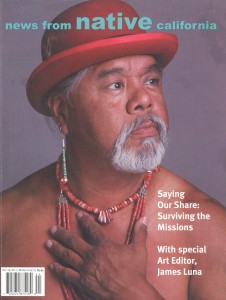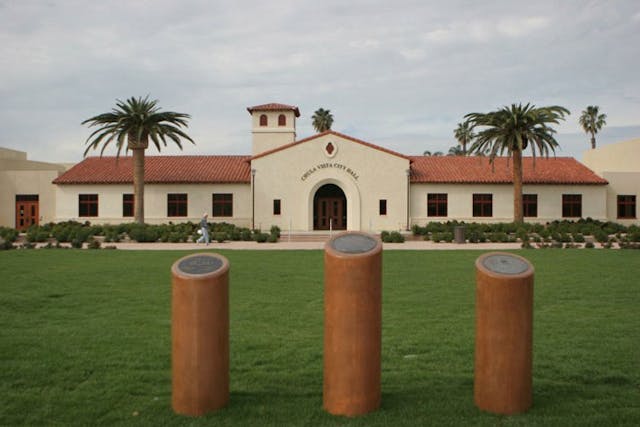With the Serra Canonization: Franciscans need to apologize for mistreating the Mission Indians
Perspective:
By Mark R. Day
If history is not just the past, but part of the present, as William Faulkner once wrote, then the stories of the surviving families of Native Californians have a lot to tell us about the California mission period from 1769 to 1833.
Memories of the suffering, abuse, deaths and destruction of their cultures are part of a legacy they live with every day.
So they question the Catholic Church’s plans to canonize Fray Junipero Serra, the founding father of the 21 California missions. To them, it is like pouring salt on wounds that never healed.
What should be the response, then, of the California Franciscans to this event? Will the Serra canonization create an atmosphere of ecclesiastical triumphalism, or will it provide an opportunity for long overdue apologies and reconciliation?
Most recent commentaries on this subject are written by white people, and not by natives who bore the brunt of the spiritual and political conquest of California.
 That’s why the publication this month of “News From Native California” and its feature articles on “Surviving the Missions” is so timely. With art, essays and poetry, several Native Californians tell their stories of struggle and survival.
That’s why the publication this month of “News From Native California” and its feature articles on “Surviving the Missions” is so timely. With art, essays and poetry, several Native Californians tell their stories of struggle and survival.
In one of the more moving essays, Deborah Miranda of Esselen / Chumash responds to a fourth grader named Sonora who wants to know if the Indians liked the missions and if the priests were good. Miranda writes that although some Indians believe the missions brought them Catholicism and agriculture, others insist that anything that kills about 80 percent of your people can’t be all that good.
Miranda explains to Sonora that once the Franciscans baptized the Indians, they refused to let them leave the missions. Nor could their family members visit them unless they were baptized. Girls under seven were locked up in dirty rooms at the missions (called monjerios) and got sick from the lack of sanitation. Meanwhile their parents were forced to work on the mission’s farms.
The Indians were beaten frequently for not obeying the rules of the missions, for reverting to their native religious practices, gathering wild food, hunting, or visiting their families.
Moreover, the friars made changes to the Indian’s diet, supplanting it with European foods that weakened their immune systems and made them prey to diseases such as smallpox, measles and tuberculosis.
The mission system, Miranda explains to Sonora, was a disaster. The Indian population was decimated because of European diseases, and the Indians lost their land, their religion, their language and their communities. And after the mission period ended in 1833, the remaining land was taken over by non-Indians and later by Anglo settlers who arrived with the Gold Rush.
As for the priests, said Miranda, some were considered kind, and others mean. Father Serra, she says, defended the Indians at times, but “he never thought to ask, as you did, Sonora, what the Indians thought of the missions or the priests.”
Serra, Miranda writes, believed that the Spaniards’ way was the only way, that Indians had to change, even if it meant killing them, or spreading disease, or denying their human rights. “This way of thinking is called colonization—a very strange way of seeing the world. Good luck with your report.”
In other thoughtful essays, Native American educators deal with the sensitive question of how to talk to children about Spanish colonization and the missions. How does one tell the truth without terrifying the students? And how does one discuss the Spanish colonizers without demonizing them, since many were sincere and well intentioned?
In another powerful essay, “Under the Lock and Key,” Terria Smith of the Torres Martinez Desert Cahuilla writes that the priests taught Indians patriarchy, a system that was violent and male dominated. Rape, physical abuse and imprisonment were commonplace at all the missions.
Serra himself complained about the soldiers lassoing Indian women and raping them. “At times Indian men would try to defend their wives, only to be shot down with bullets,” he wrote.
Smith believes the legacy violence and abuse against native American women is still a common phenomenon, but that “an essential part of the healing process is to understand what our ancestors went though.”
The canonization of Fray Junipero Serra, that will take place in Washington D.C. this fall is largely the work of Catholic church dignitaries with a Eurocentric view of history. Chances are that if Native Californians had any say in this process, they would vote against it.
Serra was not a champion of Indian rights. He occasionally intervened on their behalf, but he was a hard–nosed administrator who believed floggings were necessary if the Indians disobeyed the rules. Despite his good intentions, he was essentially a company man.
True saints are not company men. They think outside the box. They are rebels and whistleblowers. They make things messy.
The powers that be don’t want them around and try to silence them.
Given the deep wounds created by the mission legacy, the California Franciscans should follow the example of Bishop Francis A. Quinn of Sacramento who made a public apology to the Miwok Indians of Mission San Rafael in 2007 for the church’s “cruel punishment of them” two centuries earlier.
“Some of the missionaries treated them unfairly for not accepting European Catholicism and disciplined them for not following what they taught them,” said Quinn. He added that several Miwoks wept when they heard him speak and said his remarks were historic.
And what about Francis of Assisi, who founded the Franciscan order? He was a pacifist who treated all creatures with deep love and respect. He even moved a worm from one side of the road to the other, so that “brother worm” would not be run over.
He would never have tolerated abuse in any form to another human being.
Francis would have vigorously opposed the disastrous and bloody joint venture of his friars with the Spanish military in the conquest of California.
It’s time for the friars to apologize.
Mark R. Day is a former Franciscan friar, journalist, filmmaker and labor activist. He is the author of Forty Acres: Cesar Chavez and the Farmworkers, New York: Praeger, 1971. mday700@yahoo.com



 Arturo Castañares
Arturo Castañares


